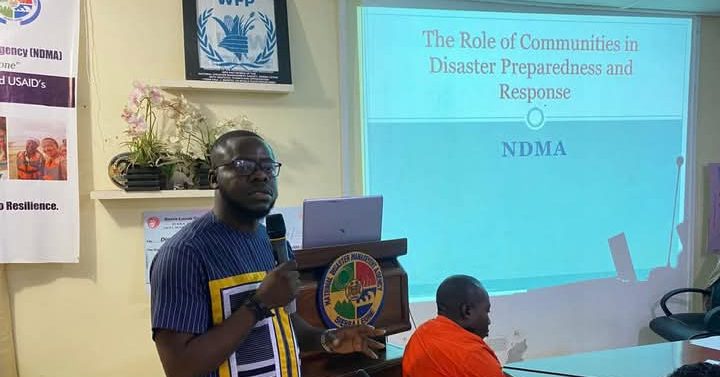The National Disaster Management Agency (NDMA), in partnership with Goal Sierra Leone, the National Fire Force (NFF), and the Sierra Leone Navy has conducted a one-day training session on Early Warning Systems and Disaster Preparedness for stakeholders and volunteers in four vulnerable coastal communities: Portee-Rokupa, Old Wharf, Tokeh, and Fogboh.
The training took place in Freetown on February 19, 2025.
The initiative aimed to bolster community resilience by equipping local residents with essential disaster preparedness skills, including early warning systems, search and rescue techniques, first aid, and evacuation procedures.
Given the high risk of flooding, rising sea levels, and fire outbreaks in these coastal areas, the training sought to enhance their capacity for effective disaster risk reduction and emergency response.
Abraham Kpama Jusu of Goal Sierra Leone explained that the four communities were specifically chosen due to their heightened exposure to climate-related hazards. He emphasized that building their disaster preparedness capacity would significantly mitigate the impact of potential disasters by enabling them to take proactive measures to protect lives and property.
Gerald King, NDMA’s Western Area Regional Coordinator, highlighted the critical role of early warning systems in disaster management, stressing that timely alerts allow communities to anticipate hazards and take preventive action.
Philomina Isatu Turay, NDMA’s Deputy Director of Communications, underscored the importance of clear and effective messaging in early warning dissemination to prevent panic and misinformation during emergencies.
She also stressed the role of local leaders and disaster response teams in ensuring effective communication during crises, urging communities to prioritize accurate and timely information sharing to enhance preparedness and reduce disaster risks.
Participants were given the opportunity to practice their newly acquired skills through real-life scenarios. At the conclusion of the training, attendees were encouraged to share their knowledge within their communities and actively participate in local disaster preparedness initiatives.


 Post a comment
Post a comment 








